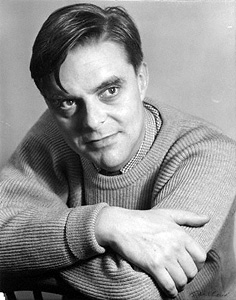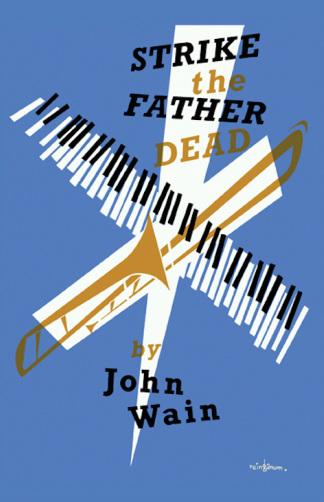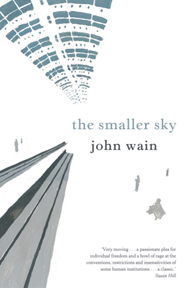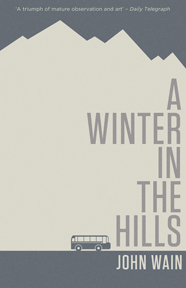|
BOOK DETAILS
Trade paper ISBN-13: 978-1941147184 List Price: $18.99 U.S. Pages: 302 Published: 2014 |
Strike the Father Dead (1962)
John Wain With a new introduction by Alice Ferrebe Due to copyright restrictions, this title is only available to customers in the U.S. and Canada.
Book Description
‘The endless round of duties and responsibilities that had been palmed off on me as a life – it wasn’t a life, it was a fraud, and I knew it.’ So says teenager Jeremy Coleman, whose father, an austere classics professor, disapproves of the boy’s preference for jazz music over Greek grammar. After a final falling-out with his father, Jeremy runs away from home, disappearing into the dives of wartime London, where he plays jazz for a living in seedy nightclubs while evading conscription. He soon encounters the other denizens of this strange twilight world of draft-dodgers and itinerant musicians, and his life changes forever when he meets a black jazzman from Baltimore, Percy Brett. They form a band, and their success in London and Paris leads to a big offer from an American recording executive. But on the eve of their greatest triumph, Jeremy and Percy become the targets of a vicious racial attack, a brutal assault that may have unexpected consequences for their musical future, and for Jeremy’s relationship with his estranged father. . . . John Wain’s lifelong love of jazz music permeates his classic fifth novel, Strike the Father Dead (1962), which won critical acclaim and showed a very different side to the author, whose Hurry on Down (1953) had been a smash success. This edition features a new introduction by Alice Ferrebe and the original jacket art by Victor Reinganum. |
reviews
‘A convincing tale, told with a tremendous gusto, full of genial sound and fury.’ – Peter Quennell, Daily Express
‘Full of meat, thoroughly thought-provoking.’ – Julian Mitchell, The Spectator
‘Mr. Wain’s best and most ambitious novel to date.’ – Birmingham Post
‘Full of meat, thoroughly thought-provoking.’ – Julian Mitchell, The Spectator
‘Mr. Wain’s best and most ambitious novel to date.’ – Birmingham Post
ALSO AVAILABLE THROUGH ONLINE RETAILERS
MORE TITLES BY THIS AUTHOR
AUTHOR BIOGRAPHY

John Wain was born in 1925 in Stoke-on-Trent, Staffordshire. He attended St John’s College, Oxford, earning a BA in 1946 and an MA in 1950. A prolific author and man of letters, Wain wrote poetry, novels, criticism, and biographies during a writing career that spanned more than forty years.
He started out teaching at the University of Reading, but in 1953 left to pursue writing full-time. Wain’s first novel, Hurry on Down (1953; published in the United States as Born in Captivity) was a bestseller and launched Wain’s career as a novelist. The book ran into several hardcover printings and was often reprinted as a Penguin paperback; it is credited with paving the way for later British classics of the 1950s, including Kingsley Amis’s Lucky Jim (1954) and John Braine’s Room at the Top (1957). Wain followed his first novel with a number of other novels and short story collections, including Living in the Present (1955), The Contenders (1958), A Travelling Woman (1959), Strike the Father Dead (1962), The Young Visitors (1965), Nuncle, and Other Stories (1965), and Death of the Hind Legs and Other Stories (1966). A number of contemporary critics felt some of these works represented a falling-off from Wain’s successful debut novel, but his next novel, The Smaller Sky (1967), was well received, and is arguably Wain’s masterpiece. The Smaller Sky (forthcoming in a new edition from Valancourt Books) tells the story of a man overwhelmed by the stresses of his life, who seeks refuge beneath the ‘smaller sky’ of Paddington rail station. Among his later fiction, A Winter in the Hills (1970) and Young Shoulders (1982) were particularly well regarded; the latter novel won the Whitbread Award.
In 1973, Wain was appointed the first Professor of Poetry at Oxford University, and the following year his biography of Samuel Johnson won the James Tait Black Memorial Prize. His services to literature were recognized in 1984 when he was awarded a CBE. In the late 1980s, he began his ‘Oxford Trilogy’ with Where the Rivers Meet (1988), and the final volume, Hungry Generations, was published shortly after his death in 1994.
He started out teaching at the University of Reading, but in 1953 left to pursue writing full-time. Wain’s first novel, Hurry on Down (1953; published in the United States as Born in Captivity) was a bestseller and launched Wain’s career as a novelist. The book ran into several hardcover printings and was often reprinted as a Penguin paperback; it is credited with paving the way for later British classics of the 1950s, including Kingsley Amis’s Lucky Jim (1954) and John Braine’s Room at the Top (1957). Wain followed his first novel with a number of other novels and short story collections, including Living in the Present (1955), The Contenders (1958), A Travelling Woman (1959), Strike the Father Dead (1962), The Young Visitors (1965), Nuncle, and Other Stories (1965), and Death of the Hind Legs and Other Stories (1966). A number of contemporary critics felt some of these works represented a falling-off from Wain’s successful debut novel, but his next novel, The Smaller Sky (1967), was well received, and is arguably Wain’s masterpiece. The Smaller Sky (forthcoming in a new edition from Valancourt Books) tells the story of a man overwhelmed by the stresses of his life, who seeks refuge beneath the ‘smaller sky’ of Paddington rail station. Among his later fiction, A Winter in the Hills (1970) and Young Shoulders (1982) were particularly well regarded; the latter novel won the Whitbread Award.
In 1973, Wain was appointed the first Professor of Poetry at Oxford University, and the following year his biography of Samuel Johnson won the James Tait Black Memorial Prize. His services to literature were recognized in 1984 when he was awarded a CBE. In the late 1980s, he began his ‘Oxford Trilogy’ with Where the Rivers Meet (1988), and the final volume, Hungry Generations, was published shortly after his death in 1994.



